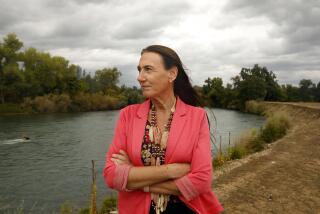Colorado Towns Dealt Opposing Hands
- Share via
CENTRAL CITY, Colo. — They lie only a mile apart, but the true distance between the two old mining towns had always been symbolized by Central City’s practice of steering its sewage down the hill and through the middle of Black Hawk. Neighborliness has never been a hallmark of the relationship between these two towns, perched above 8,000 feet in the Rockies.
Central City was always rich and snooty, complete with an opera house and beautiful old Victorian homes built with the riches from its Glory Hole gold mine. Black Hawk was the working-class town at the bottom of the heap, its mining families choking on the fumes of puffing ore smelters.
Talk about mutual contempt. “I guess you could say they can’t stand us and we can’t stand them,” said Bruce Schmalz, whose family owns the Dostal Alley Brew Pub, a bar-casino in Central City.
So it was sweet revenge for Black Hawk when gambling came to the feuding towns in 1991. A caprice of highway engineering means that gamblers from Denver reach Black Hawk first--and go no farther. The road has helped Black Hawk become the gambling mecca of Colorado, while Central City has withered.
But the revenge was apparently not sweet enough to wash away the taste of decades of resentment. Its longtime nemesis already on the ropes, Black Hawk was determined to finish Central City off for good, judging from a recent grand jury investigation.
The jury concluded that Black Hawk’s city and business leaders had conspired to thwart Central City’s grand strategy for survival--a plan to build its own direct road to the Interstate and bypass their despised neighbors at the bottom of the hill.
Black Hawk officials bought land in the path of Central City’s proposed road in an effort to block its construction, misspending public money and abusing their authority in the process, and then covered up their deeds, the jury report said.
Although the jury impaneled in Denver issued no criminal indictments, it concluded that “these actions were taken for the benefit of [Black Hawk] casinos . . . to the detriment of the citizens and businesses of Central City.”
It confirmed just the sort of chicanery that Central City always suspected, and its lawyers promptly sued Black Hawk for $100 million, alleging illegal monopoly and racketeering. Black Hawk countersued. The lawsuits are ongoing.
“We will build our new road,” vowed Central City Mayor Don Mattivi Jr., whose business card is printed on the back of a three of diamonds. “No matter what they try to do to stop us.”
Indeed, as Central City and Black Hawk compete to lure gamblers, the likely endgame, many say, will be one town or the other going out of business.
Central City has always aspired to be elegant. Its name implied its self-importance. During the 1850s gold rush heyday, when the Glory Hole mine was spitting out rich ore, the city nicknamed itself the “Richest Mile on Earth.”
The hill itself became the line of socioeconomic demarcation: the gold was mined in Central City and sent down the hill to be smelted. The rich mine owners lived up the hill, and to underscore their sophistication, erected an ornate opera house to complement the fine hotels and restaurants.
According to Colorado historian Tom Noel, “Central City had illusions of grandeur. The gold rush, for them, was a rush to respectability. The few people who made it put on airs. The town always had an attitude about Black Hawk.”
The mine workers lived in Black Hawk, which was gritty and prone to flooding. A great sulfur cloud hung over the place. Choosing to forgo the expense of bringing in coal to fuel the smelters, the townspeople felled entire hillsides of timber to feed the mills’ fires, and with each sawcut eliminated more of what remained of the area’s waning natural beauty.
After the Glory Hole mine stopped producing, modern-day Central City had enough charms to attract tourists and remain prosperous. But Black Hawk had nothing to replace the mining jobs. By the time gambling was legalized, it had about half a dozen businesses and the main street remained unpaved. As late as 1990, Black Hawk’s water mains in some places were made of wood.
Then came limited-stakes gaming, which allows a $5 maximum bet. It was introduced in Central City, Black Hawk and Cripple Creek, near Colorado Springs.
Gamblers had to work to get here. The two-lane state highway 119 follows meandering Clear Creek up a deep, narrow valley. Rock slides are common, sending unexpected boulder showers onto the roadway. The drive is even more challenging in winter.
Yet traffic has quintupled since gaming came to these adjacent towns, delivering 15,000 gamblers on weekdays and 35,000 on the weekend. Black Hawk has been the road’s main beneficiary, as it dumps busloads of travelers into the town’s ample parking lots.
Few bother to carry on up the hill to Central City.
Black Hawk’s 19 privately owned casinos generate about $35 million a month. For a town of 150, Black Hawk is ridiculously rich: Its annual budget is $22 million, and it has 100 municipal employees. And given its prior dilapidation, nobody listens to those who snipe at the town’s architecturally garish casinos.
“People who describe how gaming screwed up the quaint mining town don’t remember the quaint mining town very well,” said Black Hawk spokesman Roger Baker.
Central City’s grandeur, meanwhile, has become truly an illusion: Eleven casinos have gone out of business, leaving six, a turn of events that prompted its elaborate plan for a $45-million highway to connect it directly to I-70.
“The road is important, not just for business but for public safety too,” said Mayor Mattivi. Aside from the road through Black Hawk, the only way into Central City is a rutted track called “Oh My God” road.
There seems little room for compromise. Elected officials are deeply suspicious of each other’s motives. Black Hawk Alderman Tom Kerr would only speak briefly, saying of relations with Central City: “It’s gotten a little past animosity, I would say, but you’d have to talk to the lawyers.”
Central City’s July 3 council meeting was typically contentious. An appraiser hired by the county assessor was accused of being improperly influenced by Black Hawk. His report, presented to the Colorado Gaming Commission, showed declining property values in Central City while it painted a rosy economic picture of its rival.
At one point, it was said that forces in Black Hawk were so powerful they had been able to remove a Denver Post reporter from his beat covering the battling towns.
The reporter, George Green, roared with laughter when contacted about the accusations, which he dismissed. “With them it’s constant bickering,” Green said. “I cover their council meetings and it comes down to the mayor of Black Hawk calling residents of Central City foul names, and the residents of Central City calling the mayor foul names. I’ve never seen anything like it.”
With each side hellbent on having the last word, it seems the feud won’t be extinguished until one town dies.
As Medill Barnes, executive director of the Black Hawk Casino Owners Assn., has said, “I look with a great deal of sympathy on Central City’s current plight. But, having said that, there isn’t a wound on that poor, half-dead body that wasn’t self-inflicted.”
More to Read
Sign up for Essential California
The most important California stories and recommendations in your inbox every morning.
You may occasionally receive promotional content from the Los Angeles Times.











